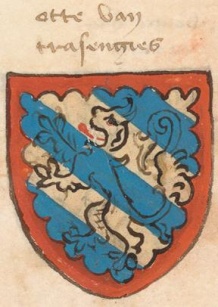Chasing, Umbration, Adumbration
WARNING: Do not cite this page as a reference. This page is on this wikispace only to make the content "searchable" and easier to find. If you find the information you seek here, go to the original sources to verify the information and use them for your documentation.
Note that chased, umbrated or adumbrated charges are not registerable under the Core Style Rules in the SCA. See Precedents below.
Period Examples:[edit | edit source]

|
Perhaps |
| Otte van Transengies Wapenboek Beyerin f18r | Perhaps an unfinished device. Sammelband mehrerer Wappenbücher - BSB Cod.icon. 391 f177r 1530, http://daten.digitale-sammlungen.de/~db/bsb00007681/image_355 |
- Bossewell's 1572 Workes of Armorie, and found what is shown as Sable, a lion rampant argent voided. The text has "M. beareth Sable, a Lyon rampant, Umbre." (Fo.25)
- Two arms that appear to belong to the Transgenies family (see one above). Beinecke MS 648 "Commonplace book on heraldry" has a similar device, with the lion counterchanged and gives the French blazon: "Bende de six pieces d'argent et d'azur a la bordure endentee de geulles et l'ombre de lyon." with the apparent name "le seigneur de trasiguint", which is possibly the same person as in the Wapenboek. [[1]]
- Gerard Legh, in his "Accedence of Armorie", f.45, writes: "He beareth Or, a lion Saliant vmbrated. This is as much to say, as the shadow of a Lion, & yet the armory is good. Here may neuer be blazed any colour because he is but traced with a pencel, vpon the field. So that the field sheweth thorough him, and therfore is of no more effect, then the shadow of man in armory."
Parker's Heraldry:[edit | edit source]
Adumbration, or Transparency: the shadow of a charge, apart from the charge itself, painted the same colour as the field upon which it is placed, but of a darker tint, or perhaps, in outline only. The term belongs rather to the romance of heraldry than to its practice, and is imagined by the writers to have been adopted by families who, having lost their possessions, and consequently being unable to maintain their dignity, chose rather to bear their hereditary arms adumbrated than to relinquish them altogether. When figured by a black line the bearing is said to be entrailed. [[2]]
Precedents:[edit | edit source]
"Although there are period examples of umbration, it is not considered "good" heraldic practice, and has been banned from use in the SCA." [1986 LoAR] "Umbration, or adumbration, is known in SCA armory as 'chasing.' 'Chased means voided but with the interior details and lines still showing as well as the outline.' (WvS, 22 Jan 80, p.3; in Prec III:14) The practice was disallowed in April 1982, as part of the general ban on 'thin‑line heraldry' that also restricted voiding and fimbriation." [1986 LoAR]